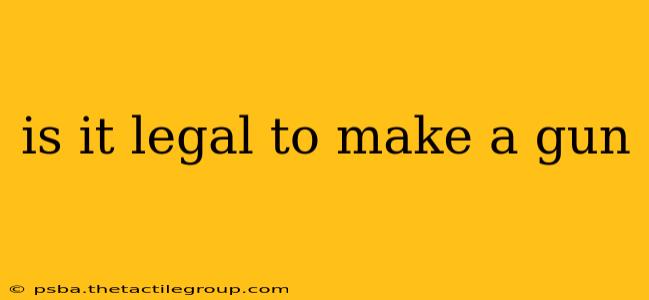Is It Legal to Make a Gun? A Complex Question with Varied Answers
The legality of making a gun is far from straightforward and depends heavily on several factors, including your location, the type of firearm you're constructing, and the specific components involved. There's no single, simple answer to this question. This article will explore the legal complexities surrounding homemade firearms in the United States and other countries.
United States Federal Law:
Federal law in the US doesn't explicitly prohibit the making of firearms for personal use, provided certain conditions are met. The core of the legal framework revolves around the Gun Control Act of 1968 (GCA) and the National Firearms Act (NFA). Key considerations include:
-
Serial Numbers: Generally, firearms manufactured for personal use are exempt from serial number requirements, but selling or transferring such a firearm would require it to be properly serialized and registered, adhering to Bureau of Alcohol, Tobacco, Firearms and Explosives (ATF) guidelines. This means a homemade gun intended for personal use only may not need a serial number, but the moment you sell it, the rules dramatically change.
-
Restricted Weapons: The NFA strictly regulates certain types of firearms, including machine guns, short-barreled rifles and shotguns, silencers, and destructive devices. Making these without the proper licenses and registrations is a serious federal offense, punishable by significant fines and imprisonment.
-
State Laws: It is crucial to understand that state laws can significantly vary and often impose stricter regulations than federal law. Some states have outright bans on homemade firearms, while others may have specific requirements regarding licensing, registration, or permitted types of firearms. It's essential to check your state's specific laws before attempting to build any firearm. Ignoring state-specific laws can lead to severe legal penalties.
State-Specific Regulations:
The legal landscape concerning homemade firearms changes drastically from state to state. Some states have permissive laws, while others have strict regulations or outright prohibitions. Researching the specific laws of your state is paramount before undertaking any firearm manufacturing. Consult the relevant state attorney general's office website or a legal professional specializing in firearms law for the most accurate and up-to-date information.
International Laws:
The legality of making a gun varies widely across different countries. Many countries have strict gun control laws that prohibit the manufacture of firearms without a license, regardless of intended use. These laws often include stringent background checks, licensing requirements, and storage regulations. Always refer to the specific laws and regulations of the country in question.
Ethical Considerations:
Beyond the legal aspects, there are significant ethical considerations surrounding the manufacture of firearms. Safe firearm handling and storage are critical to preventing accidents. Improperly constructed firearms can be inherently unsafe, posing risks to the maker and others. Responsible gun ownership involves a commitment to safety and awareness of potential consequences.
Disclaimer: This information is for educational purposes only and should not be considered legal advice. Always consult with a legal professional specializing in firearms law for advice related to your specific circumstances. The laws concerning firearm manufacturing are complex and subject to change. It is your responsibility to remain informed about and comply with all applicable federal, state, and local laws.

